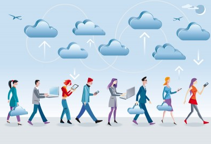Every week, hundreds of articles are published across the internet about 2017’s technology trends. One of the top trends is ‘Intelligent applications.’ Hand-in-hand with artificial intelligence, intelligent applications are on the rise.
As several modern consumer products include a microprocessor today, it is expected that in the next 10 years, almost every digital application will have some sort of artificial intelligence. VPAs (Virtual Personal Assistants), which prioritize mail and feature critical information, are already widely-used.
A lot of smart assistants are already in development by tech giants like Siri by Apple, Google Now by Google, and Cortana by Microsoft. Though users can avail limited options from these assistants yet these are getting more advanced with the time.
Oracle and Salesforce also are using Artificial Intelligence widely in distinct marketing and sales products. The consumer market also expects many opportunities, like a nutritionist, a personal trainer, a financial advisor, a personal shopping assistant, and a calendar and email manager.
Facebook owner Mark Zuckerberg built his own AI voice-controlled assistant for his home. ‘Jarvis’ is a good example of an intelligent application built by Zuckerberg in 2016. With Jarvis, Zuckerberg can talk to on his phone and personal computer. Jarvis can regulate his home, including appliances, lights, security, music, and more.
The device Jarvis also learns about the patterns and tastes of Zuckerberg and has the potential to learn more future concepts. Fun fact: Actor Morgan Freeman has granted his voice to Jarvis.
Jarvis uses many artificial intelligence techniques like speech recognition, natural language processing, reinforcement learning, and face recognition, written in PHP, Objective-C, and Python.
Zuckerberg started by developing a messenger bot to interact with Jarvis, which allowed Jarvis to translate audio clips and texts into demands. When anyone arrives at the gate of his home, Jarvis sends an image to show who is there.
The revolution of IoT-related devices has influenced acceleration in data network complexities. Smoke alarms, smart outlets, electronic door locks, lighting automation and security cameras were just the beginning. Ranging from Siri to self-driving cars, Artificial Intelligence is seamlessly progressing.
Why is it significant to research AI safety?
In the near term, the impact of AI on society motivates research in several areas- ranging from economics to technical topics like validity, verification, security, and control. However, it may be more than just a minor nuisance if your laptop gets hacked or crashes. You will expect the AI system to do the things you want it to do.
In the long term, such revolutionary technologies might help us to remove war, disease, and poverty. This means the creation of artificial intelligence might be the greatest event in human history.
Is there any danger with AI?
Researchers working on the technology agree that a super intelligent AI is unlikely to reveal human emotions like anxiety or love. Moreover, there is no reason to expect AI to become malicious or caring intentionally. The risks involved with AI:
- The AI is programmed to do something distressing – Artificial intelligence systems like autonomous weapons are programmed to kill. If these weapons are wrongly handled by people for bad things, these weapons could easily result in mass casualties. This is a serious risk for researchers, which is also present in narrow AI.
- AI is programmed to do something advantageous, but it creates a harsh method to achieve its goal – This result can be seen when we fail to completely align the goals of AI with ours.
Robots will protect us from disasters
AI for robotics will allow people to point to the challenges in taking care of an aging population and enable longer independence. It will minimize the traffic accidents and deaths. It also enables disaster response for hazardous situations like the nuclear meltdown at the Fukushima power plant
Researchers are putting AI to work for us, not against us
- Genuine machine intelligence needs more training and real-life experience
To educate smart machines, you need to run experiments and training machine learning methods on massive data, much of which is not clearly identified.
This means more jobs for training computers and making them learn about new fields, and providing sophisticated services to help drive better decision making, enhance user and client engagement and more productive work environments.
Many big data solution providers cover Jarvis technology, the risks and benefits of AI and how the use of AI will create more jobs. Mark Zuckerberg has made Jarvis for his home, but researchers are working on AI that will help humans in a multitude of ways.







